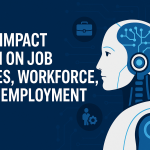Artificial Intelligence (AI) is no longer just a concept confined to sci-fi movies—it’s an integral part of our daily lives and is rapidly transforming industries, societies, and personal experiences. From voice assistants to self-

driving cars and intelligent healthcare diagnostics, AI is reshaping the world at an unprecedented pace. As we step deeper into the 21st century, understanding how AI is influencing the world and what the future holds is not only fascinating but essential.
What is Artificial Intelligence?
Artificial Intelligence refers to the simulation of human intelligence processes by machines, especially computer systems. These processes include learning (acquiring information and rules), reasoning (applying rules to reach conclusions), and self-correction. Machine Learning (ML), Natural Language Processing (NLP), and Deep Learning are all subfields of AI, each contributing uniquely to its capabilities.
AI in Everyday Life
You might not notice it, but AI is already present in your daily routines. If you’ve ever asked Siri or Alexa a question, used Google Maps for directions, or received recommendations on Netflix, you’ve interacted with AI. These tools rely on sophisticated algorithms that analyze your behavior, preferences, and patterns to provide personalized experiences.
Social media platforms use AI to curate your feeds, identify faces in photos, and even detect harmful content. Online retailers use it to predict shopping behaviors and suggest products. The integration of AI into these platforms improves user engagement and satisfaction, while also driving business growth.
Revolutionizing Healthcare
One of the most promising applications of AI is in the healthcare sector. AI-powered systems are now assisting doctors in diagnosing diseases with greater accuracy and speed. For example, AI algorithms can detect early signs of cancer from medical images like X-rays and MRIs more efficiently than traditional methods.
Virtual health assistants, chatbots, and robotic surgeries are enhancing patient care and reducing the burden on healthcare providers. AI is also playing a key role in drug discovery, helping pharmaceutical companies develop new medications faster and at a lower cost.
AI in Education
The education sector is also undergoing a transformation thanks to AI. Personalized learning platforms powered by AI can adapt to individual learning styles, paces, and interests. These platforms provide instant feedback, recommend resources, and even identify areas where students are struggling.
Educators are using AI to automate administrative tasks such as grading and attendance, allowing them to focus more on teaching. Additionally, AI-driven language translation tools are breaking down barriers and making education more accessible worldwide.
Transforming Transportation
AI is at the core of innovations in transportation, especially with autonomous vehicles. Self-driving cars use AI to interpret sensory data, make decisions, and navigate safely. While fully autonomous vehicles are still being tested, semi-autonomous features like lane detection, adaptive cruise control, and collision avoidance are already on the roads.
AI also optimizes logistics and supply chain management, helping companies reduce fuel consumption, improve delivery times, and minimize operational costs. In public transportation, AI is being used to predict maintenance needs and optimize routes for better efficiency.
AI in Business and Industry
Businesses across the globe are leveraging AI to gain a competitive edge. AI-driven analytics tools help companies interpret massive amounts of data, identify trends, and make informed decisions. Chatbots handle customer service inquiries 24/7, improving response times and customer satisfaction.
In manufacturing, AI-driven robots are used for repetitive and dangerous tasks, improving safety and efficiency. Predictive maintenance, powered by AI, ensures machinery is serviced before breakdowns occur, reducing downtime and repair costs.
Ethical Considerations and Challenges
Despite its vast benefits, the rapid adoption of AI brings ethical challenges and concerns. Issues such as data privacy, algorithmic bias, and job displacement are being widely debated. AI systems are only as unbiased as the data they are trained on. If not carefully managed, AI can unintentionally reinforce societal biases or lead to discriminatory outcomes.
Job automation is another concern. While AI creates new opportunities in tech and data science, it also risks replacing jobs in sectors like manufacturing, customer service, and transportation. Governments and organizations must invest in reskilling and upskilling programs to prepare the workforce for the AI era.
The Future of AI: What’s Next?
Looking ahead, AI is poised to become even more sophisticated and integrated into our lives. Here are a few key trends shaping the future:
-
Explainable AI: As AI systems become more complex, there’s a growing demand for transparency. Explainable AI will help users understand how decisions are made, increasing trust and accountability.
-
AI and IoT Integration: The fusion of AI and the Internet of Things (IoT) will lead to smarter homes, cities, and industrial systems. Devices will learn from user behavior and environmental factors to optimize performance.
-
AI in Climate Action: AI will be instrumental in combating climate change by modeling environmental trends, optimizing energy use, and monitoring pollution.
-
Human-AI Collaboration: Rather than replacing humans, AI will increasingly act as an assistant, enhancing human creativity, productivity, and decision-making.
-
Regulations and Governance: As AI continues to grow, regulatory frameworks will emerge to ensure ethical use, data protection, and public safety.
Conclusion
AI is not just a buzzword—it’s a transformative force that’s reshaping how we live, work, and interact. From healthcare to education, transportation to business, AI’s potential is boundless. However, with great power comes great responsibility. Ensuring that AI is developed and used ethically will be critical in shaping a future where technology enhances humanity.
As we move forward, embracing AI with a balanced approach—leveraging its benefits while addressing its challenges—will be key to unlocking a smarter, more connected, and more equitable world.











1 thought on “The Future of AI: How AI Is Changing the World”